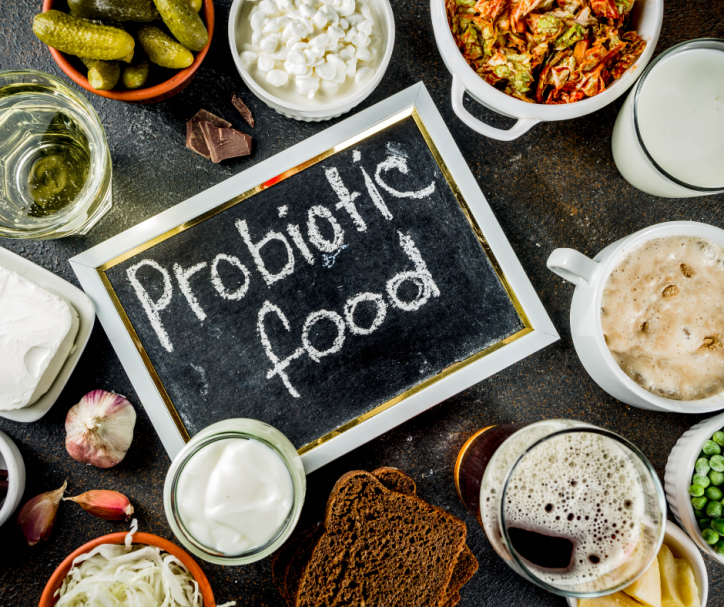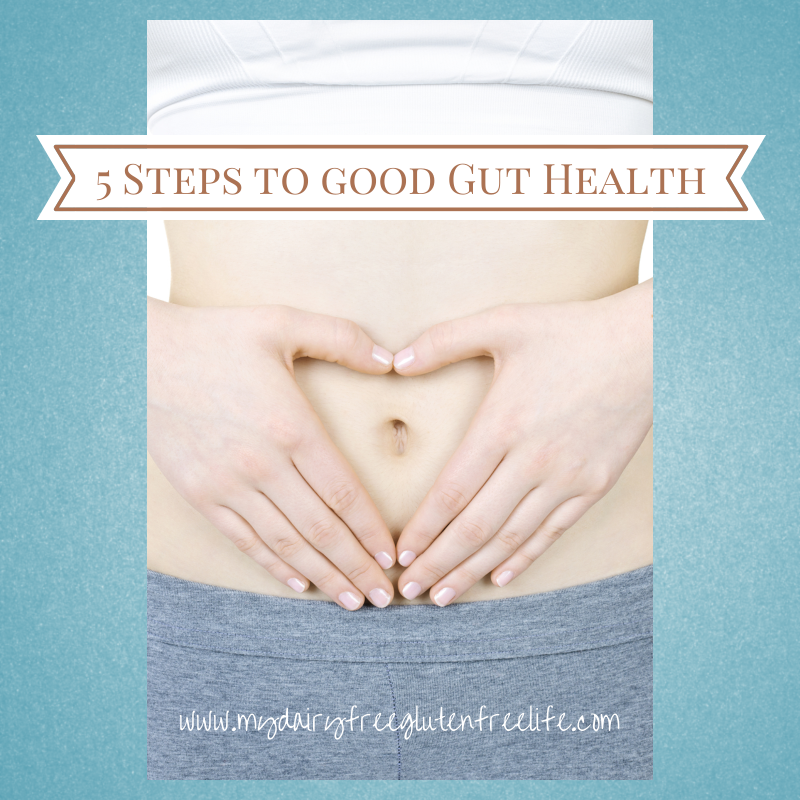I’m happy to share with you five different steps to Good Gut Health that you can take to improve your digestive health. Each one of these steps independently will have a significant impact on your overall mental and physical wellbeing. In addition, all 5 steps are intricately linked.
Attempting to adopt all these steps into your lifestyle may feel overwhelming. However, take it easy on yourself and focus on one step at a time. Set goals, create a plan and give yourself several weeks to make each step a habit and part of your daily routine. Some steps will be easier and will resonate with you more than others.
It’s okay to start with the step that seems most approachable and reasonable for you right now. Keep in mind that you don’t have to be 100% perfect. For example, if one step is to get eight hours of sleep each night and you only get five hours of sleep tonight, that isn’t a sign of failure nor is it a signal to give up.
Assess what happened, make changes, and move forward. Don’t let mistakes or bumps in the road set you back. Good health and wellbeing is a lifelong pursuit, not an overnight achievement.
On that note, let’s start with the first step towards good gut health – it may be the most difficult yet most powerful step you can take for your health.
Step #1 – Eat Whole, Unprocessed Foods
Busy lives mean that many of us turn to foods that are quick and easy to eat. We eat boxes of cereal, frozen pizzas and food that comes in a can. These foods are processed. The nutrients are often seriously depleted and fat, sugar, and chemicals are added to make them taste appealing.
These foods can wreak havoc in your gut. Not only are the chemicals detrimental to the bacteria in your gut – the fat, sugar, and sodium levels cause digestive issues which over time can result in disease.
Whole foods are foods that have little or no processing. We’re talking about foods that don’t come in bags or boxes but rather as nature created them. Meat, fruit, vegetables, and whole grains are examples of whole foods. One rule of thumb that makes it easier for some people to differentiate between whole and processed foods is to ask the question, “Did your great grandmother eat it?”

So how do you make sure to eat more whole, unprocessed foods when you’re so busy? The key is to plan ahead. Find recipes that work for you and your lifestyle. Make time to cook, even if it’s on the weekends, and stick to the produce section when you’re shopping. Whole foods can be quick and easy too. For example, you might hard boil a dozen eggs on Sunday and have hard boiled eggs and a piece of fruit for breakfast during the week. That’s faster than a run through the fast food drive through and better for you than a bowl of sugary cereal.
Why whole foods? The simple answer is fiber. Fiber helps the good bacteria in your gut thrive which helps to build good gut health. It also reduces any bad bacteria by moving material through your system in an effective and efficient way. When material is allowed to sit in your gut, that’s when the bad bacteria have an opportunity to thrive. It’s when the lining of your digestive system can become irritated and inflamed and toxins can be produced.
Step #2 – Identify and Eliminate Food Sensitivities and Allergies
It’s becoming more and more common for people to suffer from food sensitivities. On a very simple level food sensitivities and allergies can cause gas, bloating, and diarrhea or constipation. On a more serious level they can cause skin irritation like acne or eczema; they can also cause inflammation, malnutrition, and depression or neurological symptoms.
The key to identifying if you have any sensitivity is to go on an elimination diet. Don’t worry; it’s not as difficult as it sounds. In fact, it’s pretty simple. You eliminate the most common allergens from your diet for two weeks. You then gradually add them back into your diet one by one and assess how you feel.
For example, corn is a common irritant. If you eliminate it for two weeks and then add it back into your diet, you might get a headache. That’s a sign of sensitivity.
Common irritants include gluten, dairy, corn, soy, eggs and nuts. Consider keeping a journal to help you identify signs of sensitivity. Elimination diets aren’t difficult to manage with good planning, and they can be invaluable to help you identify foods that are making you sick.
Step #3 – Balance the Bacteria
As previously mentioned, there are millions of bacteria in your gut and the vast majority of these bacteria are essential for your good health. When we’re in our mother’s uterus, we’re free from bacteria. The process of being born immediately exposes us to bacteria.
Scientists believe that the first few months of life essentially set the tone for the types of bacteria in and around our body. They call it the “Microbial cloud.” We each have a somewhat unique cloud based on the home and family we’re born into – we are exposed to our parents’ bacteria and thus they become our bacteria.
Environmental influences and the food we eat can then tip the scale and support good gut health, or it can deplete the good bacteria in our gut and cause health problems.
You can keep your healthy bacteria in check by:
- Cutting back on sugar – Bad bacteria thrive on sugar, so reducing it or cutting it out of your diet will help.
- Getting more fiber in your diet – We’re back to whole foods including fruit, vegetables, and whole grains. Fiber helps move material through your system and creates a healthy environment for good bacteria to thrive.
- Adding prebiotics to your diet – Prebiotics are nutrients that help create a healthy environment for good bacteria. They’ve been shown to reduce gastrointestinal diseases as well as improve digestion and absorption. While there are now supplement forms of prebiotics, the best sources are natural food sources. Onions, leeks, garlic, green leafy vegetables and whole grains can be excellent sources of prebiotics.
- Add probiotics to your diet – Probiotics are actual organisms that impact digestion and help you enjoy a healthy gut. You can obtain probiotics by eating fermented foods, eating yogurt or cultured foods, and by taking supplements.
- Common probiotics include:
- Bifidobacterium lactis
- Lactobacillus reuteri
- Lactobacillus rhamnosus
- Lactobacillus casei
If you’re adding probiotics to your diet via supplementation, take care to add them slowly. Adding too much, too quickly can cause digestive problems including nausea.

Step #4 – Heal Your Gut
There’s a good chance that you have some irritation and inflammation in your gut already. If this isn’t repaired, it can become a problem down the road. Chronic inflammation is the precursor to most if not all disease. There are some easy ways to heal your gut including:
- Getting enough Omega 3 fatty acids – Eat cold water fish several times a week or take an omega 3 supplement. It reduces inflammation throughout your body and healthy fats are great for your organs and vital systems.
- Get enough calcium, magnesium, glutamine and zinc – these nutrients have been shown to facilitate digestion and cellular repair as well as heal the lining of your digestive system. They can all be found in food sources. You can also supplement.
- Cut back on unhealthy habits like drinking alcohol and smoking – both nicotine and alcohol cause inflammation throughout your body. If you are a drinker (more than two drinks a day) or a smoker, then cut back to improve your digestive health and heal your gut.
Step #5 – Reduce Stress
Not too long ago people believed that stress caused ulcers and many digestive disorders. They now know that this isn’t true. However, chronic stress does release the hormone cortisol.
Cortisol reduces your immune system which increases inflammation. It also changes how you digest and absorb foods. It slows digestion down which can lead to constipation and bloating. It also causes an increase in stomach acid which can wear away at the lining.
All combined, stress causes significant damage to your digestive system. There are many ways to reduce stress including but not limited to:
- Exercise
- Meditation
- Participating in activities that bring you joy
- Biofeedback
- Aromatherapy
- Massage and touch therapy
Remember that you don’t have to implement all of these steps at once. Identify one that you want to focus on and make it part of your life. Even something as simple as taking a daily probiotic and adding vegetables to every meal can make a significant difference in your digestive health.
I hope you have found these steps to good gut health helpful!


All these steps have really helped but it’s taken years. Cutting out sugar, taking my probiotics, and exercising have been biggies that really make a difference in how my gut feels daily.
Those are some really great tips for digestive health! This is an area most of my family could use some help with so I’m glad I came across this.
on item #5 – they say that prayer helps too….. 😀
ChristianDiva thanks for adding Prayer! Most powerful 🙂